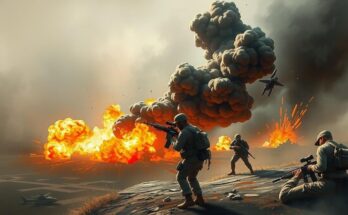Nearly 3,000 people have died in clashes between M23 militants and the DRC army over Goma, as reported by UN officials. The M23 has taken control of Goma, leading to widespread displacement and humanitarian issues. Restrictions on UN peacekeepers and rising prices exacerbate the local crisis, while the M23’s advance poses further threats to nearby areas.
A senior official from the United Nations has reported that nearly 3,000 fatalities have occurred in ongoing conflicts in the Democratic Republic of Congo, specifically concerning the M23 militia’s struggle for control over Goma, a significant eastern city. Vivian van de Perre, the deputy head of the UN mission in the DRC, mentioned that UN teams are actively involved in the recovery of bodies, with around 2,000 already retrieved and 900 stored in hospital morgues. The continuation of violence raises concerns about potential outbreaks of disease due to the presence of decomposing bodies.
The M23 group resumed hostilities in early January after violating a ceasefire and launching an extensive military offensive, supported allegedly by the Rwandan forces. According to the M23, they have successfully taken over Goma, which has led to mass displacement of thousands from the area, exacerbating the humanitarian crisis. The DRC government has persistently accused Rwanda of aiding the M23, an allegation that Rwanda denies.
Currently, M23 has established firm control over Goma, as all exit routes and the airport are now under their management. The United Nations classifies the M23 as an armed rebel group, while the Congolese government has labeled them as a terrorist organization. The escalating violence has driven massive human suffering and increased displacement in the region, as many civilians have taken refuge in UN peacekeeping bases, which are now overcrowded.
While water and electricity supply to Goma has been partially restored, markets are reopening amid soaring prices due to the conflict. UN peacekeepers from MONUSCO are facing restrictions on their movements, requiring notification 48 hours before any transfer. Reports suggest the M23 has interfered with some humanitarian work and media, indicating a potential escalation in control over local resources.
As the M23 advances towards Bukavu, heavy clashes have been reported along the route between Kinyezire and Nyabibwe. The situation in Bukavu is tense, positioned just 50 kilometers from the advancing militia. MONUSCO is in the process of reducing its peacekeeping presence at the Congolese government’s request and has recently vacated South Kivu province entirely.
The Democratic Republic of Congo has been grappling with prolonged conflicts, particularly in the eastern regions where militia groups like M23 operate. The area is rich in minerals, fueling ongoing battles for control over resources. International attention has been drawn to the humanitarian impact of these conflicts, with thousands displaced and significant loss of life as the violence continues. The involvement of neighboring countries, especially Rwanda, complicates the situation, with mutual accusations of support for opposing armed groups contributing to regional tensions.
The situation in Goma and surrounding regions of the DRC remains dire, with substantial loss of life and growing humanitarian crises due to the violent confrontations between M23 militants and government forces. The role of international peacekeepers continues to be critical as they navigate restrictions imposed by the M23. With increasingly grave concerns over health threats from decomposing bodies and overcrowded shelters, urgent action is needed to mitigate the suffering of civilians caught in the conflict. The advancement of M23 towards Bukavu raises significant fears for the stability of the region.
Original Source: www.voanews.com




